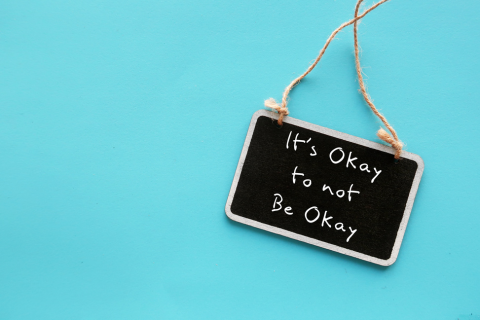
When your phone glitches and freezes or hangs up on someone mid-call, you might get frustrated, feel embarrassed, and you might say a few choice words to your phone! Things like computers, phones, robot vacuums (the list can go on—you get the point) are programmed to work properly, accurately, and consistently. Despite that, sometimes they fail in big and small ways. If carefully and methodically programmed technological devices with technical support teams behind them can fail and make mistakes, it is even more likely and expected that in our humanness, we can too! Take a few moments to ask yourself these two questions:
-
- The last time I saw someone struggling, how did I treat them?
- The last time I struggled, how did I treat myself?
Research suggests it’s likely you would feel compassion toward a friend who is struggling. Yet you might not extend that same kindness to yourself. Often we hold a high bar for ourselves, and when we don’t meet our own expectations, we can become very critical of ourselves. Rather than thinking “I made a mistake,” we can quickly think, “I am a complete loser.” We extend the Golden Rule to others but not to ourselves.
 The concept of extending kindness toward yourself is captured in Dr. Kristin Neff’s construct of self-compassion, which she defines as responding to failure with kindness and understanding. When people first hear about this concept, some misunderstand it and begin to worry that it offers an excuse to not hold ourselves accountable or that self compassion is just a way of giving ourselves ‘a pass’ after making a mistake. Following this line of thinking, it seems that self-compassion could lead to self-indulgence, result in losing motivation, and derail us from achieving our goals. However, that does not seem to be the case. According to Forbes, “research shows excessive self-criticism can paralyze rather than motivate and create greater problems, including procrastination, avoidance behaviors and even depression.” The article goes on to say, “research directly links self-compassion to better mental health, better physical health and a number of other benefits.” Self-compassion comes in to create space for growth by acknowledging that making mistakes is normal! Even if others might not show it (think social media here!), we all make mistakes—that is part of our common humanity. If we meet ourselves with harsh criticism, we leave little room for learning. If we believe the inner critic that we failed and cannot do better, there isn’t much motivation to keep trying!
The concept of extending kindness toward yourself is captured in Dr. Kristin Neff’s construct of self-compassion, which she defines as responding to failure with kindness and understanding. When people first hear about this concept, some misunderstand it and begin to worry that it offers an excuse to not hold ourselves accountable or that self compassion is just a way of giving ourselves ‘a pass’ after making a mistake. Following this line of thinking, it seems that self-compassion could lead to self-indulgence, result in losing motivation, and derail us from achieving our goals. However, that does not seem to be the case. According to Forbes, “research shows excessive self-criticism can paralyze rather than motivate and create greater problems, including procrastination, avoidance behaviors and even depression.” The article goes on to say, “research directly links self-compassion to better mental health, better physical health and a number of other benefits.” Self-compassion comes in to create space for growth by acknowledging that making mistakes is normal! Even if others might not show it (think social media here!), we all make mistakes—that is part of our common humanity. If we meet ourselves with harsh criticism, we leave little room for learning. If we believe the inner critic that we failed and cannot do better, there isn’t much motivation to keep trying!
Practicing self-compassion can be a challenge, especially if you have been self-critical for the majority of your life. Dr. Neff’s website provides a variety of research based tools that can help!
As you are thinking about ways you can meet yourself with kindness and self-compassion, this video can offer some helpful perspectives to consider. It reviews the different benefits of self-compassion and honoring the difficulty of engaging with ourselves in that way. I would love to help you amplify your self-compassionate voice!
Contributor Statement: Olivia Knizek (oliviaknizek@my.unt.edu) contributed to the research and writing of this blog. Olivia is a PhD student in counseling psychology interested in athlete mental health, performing artists, and resiliency from trauma.
